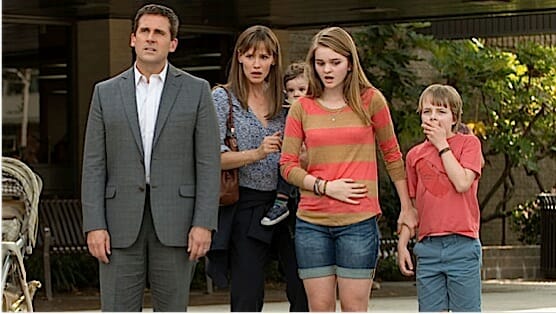Alexander and the Terrible, Horrible, No Good, Very Bad Day

One thing should be made clear about Alexander and the Terrible, Horrible, No Good, Very Bad Day up front: it’s lying to you. Yes, this is a movie about Alexander, and yes, this is a movie about a terrible, horrible, no good, very bad day. But in Miguel Arteta’s screen adaptation of Judith Viorst’s delightfully nihilistic 1972 children’s book, Alexander Cooper’s family endures a twenty-four hour marathon of calamity while he bears witness. He’s a catalyst more than a character, barely present in the story that’s named for him.
Oh, sure, the film starts off with Alexander having what categorically qualifies as a bummer day. The kid wakes up with gum in his hair, his friends ditch his birthday party to attend a last-minute shindig thrown by the richest, coolest and dumbest kid in school, and he burns down his school’s science lab in front of his crush. But that’s just fifteen minutes out of an eighty-minute movie, and frankly they’re not the worst minutes anybody might endure in a theater this year. All the same, we feel for Alexander; he’s equally invisible at school as at home. So, in hopes of making his parents and siblings understand how he feels, he wishes for them all to have a single day as bad as his. Miraculously, it works, and almost too well, because we spend the next hour watching the rest of the Coopers suffer one ignominy after the other while a bewildered Alexander observes from the sidelines.
So Hollywood has edged Alexander out of his own movie in favor of Brick Tamland and Sydney Bristow. It’s Viorst’s original yarn in name only, but there’s a perfectly reasonable explanation as to why. Movie stars sell movies, for one, and for another, Steve Carell, Jennifer Garner, and the Terrible, Horrible, No Good, Very Bad Day doesn’t quite roll off the tongue. But by making the film about them at the expense of Ed Oxenbould’s eponymous schlemiel, Alexander becomes both a paean for the power of positive thinking and a slice of preteen wish fulfillment. On paper, that sounds lovely, and in practice it’s endearing enough. Who can really fault a movie for arguing that a chipper disposition is the best way to get through crummy times?
-

-

-

-

-

-

-

-

-

-

-

-

-

-

-

-

-

-

-

-

-

-

-

-

-

-

-

-

-

-

-

-

-

-

-

-

-

-

-

-








































